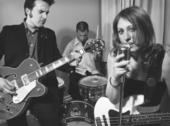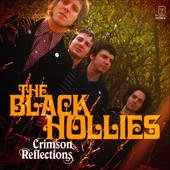Electronic Voting Machines: The ProTools of Democracy?
Now that the election is a week behind us, we can step back and take stock of the momunmental change that took place in our culture. But since this isn't really a political blog, you'll have to go elsewhere for an appraisal of the political ramifications (from the right, from the left). What we're concerned with is in some ways a more dramatic change, the shift from "old-fashioned" voting technologies such as paper ballots, punch cards, and mechanical lever machines to modern electronic voting technologies. Why the change? Certainly the "hanging chad" problems in 2004 galvanized the nation to take note of the potential problems involved with the current voting technologies. But more broadly, the shift towards electronic voting machines is as inevitable as the consistent losses of third party candidates in American politics. The inexorable march of progress dictates that newer is better, and we are moving boldly into a fully digital age. But consider:
--In Florida, the home of the hanging chad, electronic voting machines "recorded unusually high percentages of ballots with no votes"
--In Ohio, my home state for better or worse, electronic voting machines were used in all districts, but with various problems reported throughout the state
--In Pennsylvania, another crucial battleground state, there were "reports of machines not going through all of the election screens, machines that were not functioning at all, machines automatically shutting down early due to timing problems"
A quick search of the Internet (one of the "good" technological advances) reveals a host of similar issues. While it may be easy to dismiss these problems as typical of the growing pains all new technologies face, the deeper question may be more revealing. Are these technologies really necessary? Or, to put it another way, are there some non-digital technologies that are actually better suited to certain jobs?
The music industry certainly provides a telling analogy. Simply put, it's clear that analog technology is better suited to making music sound real, provided of course that's what you're looking for in your music. Digital technology may "solve" a number of problems, but in the process, creates myriad new problems, some of which may be worse than the problems the technology was intended to fix. I would make the argument that the issues arising from paper ballots and the other "analog" technologies could be best fixed by updating those technologies (for example, here in New York, many of the voting machines are the same ones used forty years ago) rather than enacting a wholesale shift to a new technology. I believe this not because digital machines cannot or do not address the shortcomings of the current voting technologies, but instead because of the severity of problems introduced by these new digital machines.
It has been fairly well documented that many of these new machines provide no paper trail of the votes cast, which is a serious problem in and of itself. But of even more concern is the potential for fraud in these new voting technologies. When the president of Diebold Inc, a leading manufacturer of voting machines said he was "committed to helping Ohio deliver its electoral votes to the president next year," it's hard not to see the sinister implications in that statement. Say what you will about those clunky old lever machines, but it's pretty hard to manipulate those paper ballots in one fell swoop, as one could do with networked machines.
Just as digital music technology seems to take something essential out of the creative process, it seems like digital voting takes something crucial out of the democratic process. We're not so naive as to believe that the American democratic process is free from all hints of corruption, but participating in the process has a major symbolic component to it, one that cannot be enjoyed if the integrity of the system is in serious doubt. When I put on a record of my favorite musician, I want to believe that everything I hear on that song is a product of a real live breathing human being. And when I cast a vote, I want to believe that my preference will be accurately recorded and counted by the powers that be. Things just don't work otherwise.
--In Florida, the home of the hanging chad, electronic voting machines "recorded unusually high percentages of ballots with no votes"
--In Ohio, my home state for better or worse, electronic voting machines were used in all districts, but with various problems reported throughout the state
--In Pennsylvania, another crucial battleground state, there were "reports of machines not going through all of the election screens, machines that were not functioning at all, machines automatically shutting down early due to timing problems"
A quick search of the Internet (one of the "good" technological advances) reveals a host of similar issues. While it may be easy to dismiss these problems as typical of the growing pains all new technologies face, the deeper question may be more revealing. Are these technologies really necessary? Or, to put it another way, are there some non-digital technologies that are actually better suited to certain jobs?
The music industry certainly provides a telling analogy. Simply put, it's clear that analog technology is better suited to making music sound real, provided of course that's what you're looking for in your music. Digital technology may "solve" a number of problems, but in the process, creates myriad new problems, some of which may be worse than the problems the technology was intended to fix. I would make the argument that the issues arising from paper ballots and the other "analog" technologies could be best fixed by updating those technologies (for example, here in New York, many of the voting machines are the same ones used forty years ago) rather than enacting a wholesale shift to a new technology. I believe this not because digital machines cannot or do not address the shortcomings of the current voting technologies, but instead because of the severity of problems introduced by these new digital machines.
It has been fairly well documented that many of these new machines provide no paper trail of the votes cast, which is a serious problem in and of itself. But of even more concern is the potential for fraud in these new voting technologies. When the president of Diebold Inc, a leading manufacturer of voting machines said he was "committed to helping Ohio deliver its electoral votes to the president next year," it's hard not to see the sinister implications in that statement. Say what you will about those clunky old lever machines, but it's pretty hard to manipulate those paper ballots in one fell swoop, as one could do with networked machines.
Just as digital music technology seems to take something essential out of the creative process, it seems like digital voting takes something crucial out of the democratic process. We're not so naive as to believe that the American democratic process is free from all hints of corruption, but participating in the process has a major symbolic component to it, one that cannot be enjoyed if the integrity of the system is in serious doubt. When I put on a record of my favorite musician, I want to believe that everything I hear on that song is a product of a real live breathing human being. And when I cast a vote, I want to believe that my preference will be accurately recorded and counted by the powers that be. Things just don't work otherwise.





